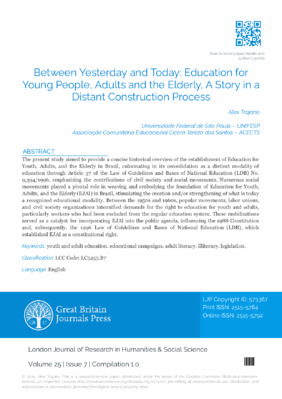Between Yesterday and Today: Education for Young People, Adults and the Elderly, A Story in A Distant Construction Process
Keywords:
brazil, multimorbidity, multiple long-term chronic conditions, socioeconomic positions, inequality measures, health inequalities, literature, image, Perrault, Dor, Ibarbourou, Higher education, developing countries, Educational technology, Generative AIs, curriculum, Occupational therapy, upgrade programs, competencies, diploma, educational campaigns, Youth and Adult Education, Adult Literacy, Illiteracy Legislation.Abstract
The present study aimed to provide a concise historical overview of the establishment of Education for Youth, Adults, and the Elderly in Brazil, culminating in its consolidation as a distinct modality of education through Article 37 of the Law of Guidelines and Bases of National Education (LDB) No. 9,394/1996, emphasizing the contributions of civil society and social movements. Numerous social movements played a pivotal role in weaving and embodying the foundation of Education for Youth, Adults, and the Elderly (EJA) in Brazil, stimulating the creation and/or strengthening of what is today a recognized educational modality. Between the 1950s and 1960s, popular movements, labor unions, and civil society organizations intensified demands for the right to education for youth and adults, particularly workers who had been excluded from the regular education system. These mobilizations served as a catalyst for incorporating EJA into the public agenda, influencing the 1988 Constitution and, subsequently, the 1996 Law of Guidelines and Bases of National Education (LDB), which established EJA as a constitutional right. However, despite these numerous efforts and initiatives, they have proven insufficient to eradicate illiteracy in Brazil. As of 2024, over 11 million individuals aged 15 and older remain unable to read, write, or even sign their names, underscoring the need for increased efforts and investments in public policies. These efforts face significant challenges under a state increasingly shaped by neoliberal and privatizing ideologies, which render the consolidation of such policies and the shift from an assistentialist approach to one focused on awareness and critical thinking increasingly arduous. The methodology employed was based on bibliographic research with descriptive characteristics, drawing on a variety of literature sources, including books, scientific articles, laws, online journals, and academic websites addressing topics pertinent to the theme. Materials published over the past 145 years (from 1879 to 2024) were utilized to construct the historical narrative of Education for Youth, Adults, and the Elderly in Brazil.
References

Downloads
Published
Issue
Section
License
Copyright (c) 2025 Authors and Global Journals Private Limited

This work is licensed under a Creative Commons Attribution 4.0 International License.





